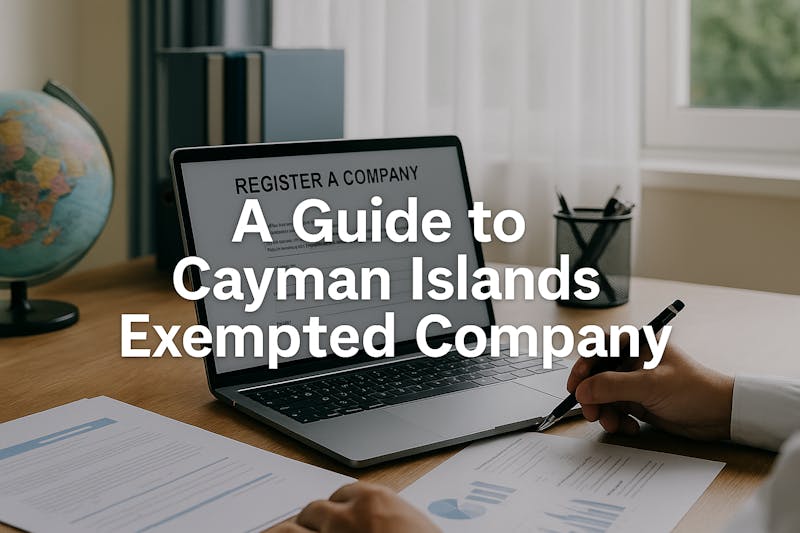A Cayman exempted company requires only one shareholder and one director. There are no residency or nationality restrictions, but a registered office in the Cayman Islands is mandatory.
Governed by the Companies Act (as amended), offering privacy, predictability, and a clear framework for cross-border business.
No local trade or public offers in the Cayman Islands without the appropriate licence, unless securities are listed on the Cayman Islands Stock Exchange (CSX).
The Beneficial Ownership Transparency Act, 2023 came into force on 31 July 2024, with core obligations effective from 1 January 2025.
Specialized options include Segregated Portfolio Companies (SPCs) and Limited Duration Companies (LDCs) for fund and investment uses.
The Cayman Islands is well known for its stable legal system and clear business rules. As a British Overseas Territory, it provides a reliable base for holding, investment, and financing structures.
Most international investors form an Exempted Company rather than an LLC because it uses a familiar share-based model and is widely accepted in cross-border transactions.
Recent updates under the Companies Act (2025 Revision) and the Beneficial Ownership Transparency Act, 2023 have refined company regulation, transparency, and conversion procedures between entities, keeping Cayman aligned with international standards.
What Is a Cayman Islands Exempted Company?
An Exempted Company is formed to conduct business mainly outside the Cayman Islands.
It is a separate legal person and continues even if shareholders or directors change.
Main features include tax neutrality, straightforward filings, and wide acceptance in international markets.
Restrictions on Activities
- Local trading: Not permitted unless the company has a specific licence. Local support services connected to international operations are allowed.
- Public offers: The company cannot invite the public in the Islands to purchase its shares unless the securities are listed on the CSX. (No statutory change in 2025 narrowed “public in the Islands”; any sophisticated/HNW concepts are regime-specific, not a blanket Companies Act carve-out.)
Benefits of a Cayman Exempted Company
1. Tax Position
There are no corporate, income, or capital gains taxes.
Companies may obtain a tax undertaking certificate confirming this position for up to 20 years (extendable to 30).
2. Simple Setup
- Minimum of one shareholder and one director
- No Cayman residency requirement
- Must maintain a registered office with a licensed local provider
3. Privacy and Regulation
Company registers (members, mortgages, charges) remain private.
From 1 January 2025, beneficial ownership details must be filed with the authorities under the Beneficial Ownership Transparency Act, 2023, but the information is not public.
4. Established Reputation
Cayman companies are recognised globally in fund, finance, and investment transactions and follow rules issued by the Cayman Islands Monetary Authority (CIMA).
Constitution of an Exempted Company in the Cayman Islands
Memorandum of Association
- The company name must be unique. Certain words such as bank, insurance, or trust require prior approval.
- Every company must maintain a registered office in the Cayman Islands through a licensed service provider.
- A company may have unrestricted objects. Entities involved in virtual asset services should ensure their activities align with the requirements of the Virtual Asset Service Providers (VASP) Act.
- Members have limited liability, meaning they are responsible only for any unpaid amounts on their shares.
- Companies may issue par or no-par value shares, but not both. Bearer shares are not allowed.
Articles of Association
Set out internal rules, including:
- Share issues, transfers, and redemptions
- Appointment and powers of directors
- Voting, meetings, and dividend procedures
- Rules for winding-up and the company’s financial year
Most companies begin with standard articles and later tailor them if needed.
Incorporation and Ongoing Filings
- Timing: Normally completed within a few business days. An express 24-hour option is available.
- Annual return: Filed each January with payment of government fees and confirmation that no local business was conducted.
Governance
Meetings
Annual general meetings (AGMs) are not required unless the articles provide otherwise. Written resolutions are commonly used.
Directors
- At least one director is required.
- No residency condition applies.
- Directors of regulated entities may need registration or licensing under the Directors Registration and Licensing Act.
- For regulated funds, two individual directors are common market practice, subject to the fund’s specific regime and CIMA rules.
Company Secretary
A company secretary is not legally required under the Companies Act, but many exempted companies choose to appoint one to handle compliance tasks.
Typical duties include preparing and filing statutory documents, maintaining registers, and ensuring annual returns are submitted on time. The role is often performed by the registered office provider.
If you’d rather not deal with these details yourself, Air Corporate’s offshore company secretary service can take care of day-to-day compliance, filings, and updates with the Cayman Registrar, letting directors focus on operations.
Registers
- Members: Kept at the registered office; private.
- Directors: Copy filed with the Registrar; a list of current directors is available for a fee. File changes with the Registrar within 30 days.
- Mortgages and charges: Maintained at the registered office.
- Beneficial ownership: Filed electronically unless exempt, under the Beneficial Ownership Transparency Act, 2023.
Financial Records
Proper accounting records must be kept, showing the company’s financial position.
Audits are required only for regulated or sector-specific entities.
Economic Substance
If a company conducts a relevant activity under the International Tax Cooperation (Economic Substance) Act, it must show:
- Direction and management from within the Cayman Islands
- Adequate people, premises, and spending locally
- Core income-generating activities (CIGA) carried out in Cayman
Pure equity holding companies are subject to a reduced ES test—generally satisfied by compliance with applicable filings and having adequate human resources and premises in Cayman for holding/management of equity participations.
All notifications and returns are filed through the Department for International Tax Cooperation (DITC) Portal.
Beneficial Ownership Rules (2025)
The Beneficial Ownership Transparency Act, 2023 modernised the filing system.
From 1 January 2025, entities must:
- Identify and report their ultimate beneficial owners (UBOs)
- Keep filings current
- Follow exemptions for listed or regulated companies
Only authorised regulators have access to this data.
Automatic Exchange of Information (AEOI)
If the company is a Reporting Financial Institution under the Foreign Account Tax Compliance Act (FATCA) or the Common Reporting Standard (CRS), it must:
- Register and perform due diligence
- Maintain written policies and procedures for FATCA/CRS compliance
- Appoint a Principal Point of Contact and Responsible Officer
- File reports annually through the DITC Portal
Other Compliance Matters
Dividends
May be paid from profits or share premium if the company remains solvent. Redemptions and repurchases are permitted subject to solvency and the articles. For entities regulated by CIMA, follow sector-specific guidance.
Investigations
Courts may appoint inspectors in cases of misconduct or shareholder disputes. Inspectors can require production of books and records.
Migrations
Companies can continue into or out of the Cayman Islands if permitted by their constitutional documents and destination laws.
Stamp Duty
Applies mainly to real estate and transfers of land-holding entities, generally up to 7.5%. Nominal duty can also apply to instruments executed in or brought into Cayman.
Other Exempted Company Types
Limited Duration Company (LDC)
- Must have at least two members
- Lifetime capped at 30 years unless ended earlier
- “Limited Duration Company” or “LDC” must appear in the name
Segregated Portfolio Company (SPC)
- Allows separated pools of assets and liabilities within one entity
- Must include “SPC” in the name
- Common in fund and insurance structures
For incorporation, filings, and maintenance, Air Corporate can manage the entire process — from setup to annual reporting.
FAQs
Exempted companies have shareholders and directors and rely on the memorandum and articles. LLCs have members and operate under an LLC agreement with more contract-driven governance. Choice depends on investor expectations, financing, and sector norms.
There are no direct taxes on company profits, income, or gains. Stamp duty can apply to certain documents and transactions. Companies may seek a tax undertaking confirming the continuation of tax neutrality for a defined term.
An exempted trust is created for non-residents and can obtain a tax undertaking for up to 50 years, commonly used for estate planning and asset protection.






